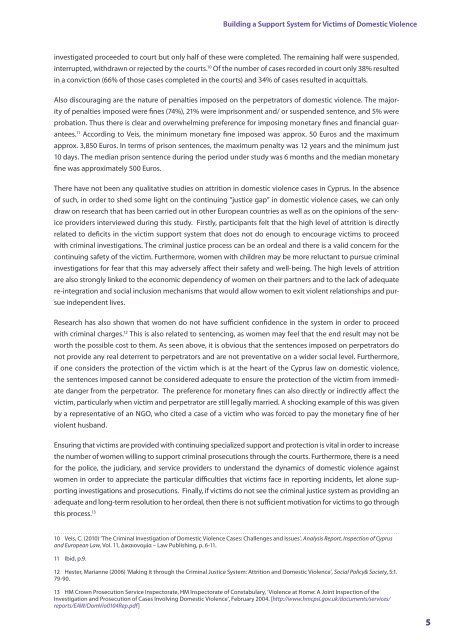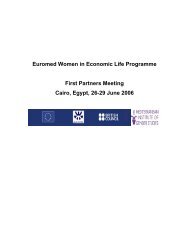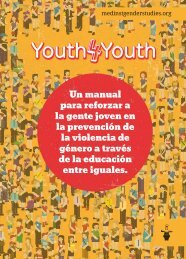react to domestic violence
react to domestic violence
react to domestic violence
You also want an ePaper? Increase the reach of your titles
YUMPU automatically turns print PDFs into web optimized ePapers that Google loves.
Building a Support System for Victims of Domestic Violence<br />
investigated proceeded <strong>to</strong> court but only half of these were completed. The remaining half were suspended,<br />
interrupted, withdrawn or rejected by the courts. 10 Of the number of cases recorded in court only 38% resulted<br />
in a conviction (66% of those cases completed in the courts) and 34% of cases resulted in acquittals.<br />
Also discouraging are the nature of penalties imposed on the perpetra<strong>to</strong>rs of <strong>domestic</strong> <strong>violence</strong>. The majority<br />
of penalties imposed were fines (74%), 21% were imprisonment and/ or suspended sentence, and 5% were<br />
probation. Thus there is clear and overwhelming preference for imposing monetary fines and financial guarantees.<br />
11 According <strong>to</strong> Veis, the minimum monetary fine imposed was approx. 50 Euros and the maximum<br />
approx. 3,850 Euros. In terms of prison sentences, the maximum penalty was 12 years and the minimum just<br />
10 days. The median prison sentence during the period under study was 6 months and the median monetary<br />
fine was approximately 500 Euros.<br />
There have not been any qualitative studies on attrition in <strong>domestic</strong> <strong>violence</strong> cases in Cyprus. In the absence<br />
of such, in order <strong>to</strong> shed some light on the continuing “justice gap” in <strong>domestic</strong> <strong>violence</strong> cases, we can only<br />
draw on research that has been carried out in other European countries as well as on the opinions of the service<br />
providers interviewed during this study. Firstly, participants felt that the high level of attrition is directly<br />
related <strong>to</strong> deficits in the victim support system that does not do enough <strong>to</strong> encourage victims <strong>to</strong> proceed<br />
with criminal investigations. The criminal justice process can be an ordeal and there is a valid concern for the<br />
continuing safety of the victim. Furthermore, women with children may be more reluctant <strong>to</strong> pursue criminal<br />
investigations for fear that this may adversely affect their safety and well-being. The high levels of attrition<br />
are also strongly linked <strong>to</strong> the economic dependency of women on their partners and <strong>to</strong> the lack of adequate<br />
re-integration and social inclusion mechanisms that would allow women <strong>to</strong> exit violent relationships and pursue<br />
independent lives.<br />
Research has also shown that women do not have sufficient confidence in the system in order <strong>to</strong> proceed<br />
with criminal charges. 12 This is also related <strong>to</strong> sentencing, as women may feel that the end result may not be<br />
worth the possible cost <strong>to</strong> them. As seen above, it is obvious that the sentences imposed on perpetra<strong>to</strong>rs do<br />
not provide any real deterrent <strong>to</strong> perpetra<strong>to</strong>rs and are not preventative on a wider social level. Furthermore,<br />
if one considers the protection of the victim which is at the heart of the Cyprus law on <strong>domestic</strong> <strong>violence</strong>,<br />
the sentences imposed cannot be considered adequate <strong>to</strong> ensure the protection of the victim from immediate<br />
danger from the perpetra<strong>to</strong>r. The preference for monetary fines can also directly or indirectly affect the<br />
victim, particularly when victim and perpetra<strong>to</strong>r are still legally married. A shocking example of this was given<br />
by a representative of an NGO, who cited a case of a victim who was forced <strong>to</strong> pay the monetary fine of her<br />
violent husband.<br />
Ensuring that victims are provided with continuing specialized support and protection is vital in order <strong>to</strong> increase<br />
the number of women willing <strong>to</strong> support criminal prosecutions through the courts. Furthermore, there is a need<br />
for the police, the judiciary, and service providers <strong>to</strong> understand the dynamics of <strong>domestic</strong> <strong>violence</strong> against<br />
women in order <strong>to</strong> appreciate the particular difficulties that victims face in reporting incidents, let alone supporting<br />
investigations and prosecutions. Finally, if victims do not see the criminal justice system as providing an<br />
adequate and long-term resolution <strong>to</strong> her ordeal, then there is not sufficient motivation for victims <strong>to</strong> go through<br />
this process. 13<br />
10 Veis, C. (2010) ‘The Criminal Investigation of Domestic Violence Cases: Challenges and Issues’, Analysis Report, Inspection of Cyprus<br />
and European Law, Vol. 11, ∆ικαιονομία – Law Publishing, p. 6-11.<br />
11 Ibid, p.9.<br />
12 Hester, Marianne (2006) ‘Making it through the Criminal Justice System: Attrition and Domestic Violence’, Social Policy& Society, 5:1.<br />
79-90.<br />
13 HM Crown Prosecution Service Inspec<strong>to</strong>rate, HM Inspec<strong>to</strong>rate of Constabulary, ‘Violence at Home: A Joint Inspection of the<br />
Investigation and Prosecution of Cases Involving Domestic Violence’, February 2004. [http://www.hmcpsi.gov.uk/documents/services/<br />
reports/EAW/DomVio0104Rep.pdf]<br />
5







